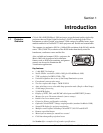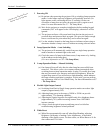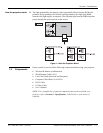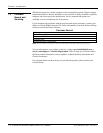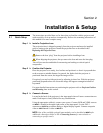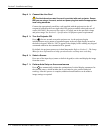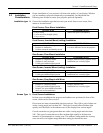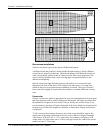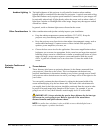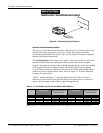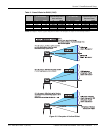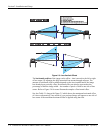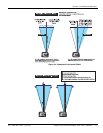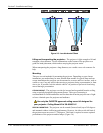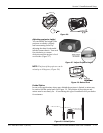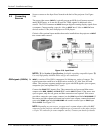
Section 2: Installation and Setup
013-100149-02 Rev. 1 (01/07) Christie DS+60/DW30/Matrix 3000 User’s Manual 2-5
The high brightness of this projector is well suited for locations where ambient
lighting might be considered less than ideal for projection. A typical room with ceiling
lights and windows rarely requires special attention. Contrast ratio in your images will
be noticeably reduced only if light directly strikes the screen, such as when a shaft of
light from a window or floodlight falls on the image. Images may then appear washed
out and less vibrant.
In general, avoid or eliminate light sources directed at the screen.
Other considerations and tips that can help improve your installation:
• Keep the ambient temperature constant and below 35°C (95°F). Keep the
projector away from heating and/or air conditioning vents.
• Keep the projector away from devices that radiate electromagnetic energy such as
motors and transformers. Common sources of these include slide projectors,
speakers, power amplifiers, elevators, etc.
• Choose the best screen size for the application. Since more magnification reduces
brightness, use a screen size appropriate for the venue but not larger than required.
Installing a large screen in a small room is similar to watching television at a close
range; too large a screen can overpower a room and interfere with the overall
effect. A good rule of thumb is to be no closer than 1.5 times the width of the
screen.
Throw distance
Throw distance (also known as projection distance) is the distance measured from
your projector’s front feet to the screen. This is an important calculation in any
projector installation as it determines whether or not you have enough room to install
your projector with a desired screen size and if your image will be of the right size for
your screen.
You can quickly estimate the throw distance by taking the horizontal width of the
screen and multiplying it by the lens throw ratio. The result of this calculation tells
you roughly how far back the projector should be positioned from the screen in order
to project a focused image large enough to fill the screen. For example, if you are
going to use a 0.8:1 lens, throw distance would roughly be 0.8 X screen width.
IMPORTANT: Always calculate the precise throw distance for the lens type
and screen size you’re going to use. Refer to Appendix D for actual throw
distance formulas and quick reference charts.
NOTE: An online lens calculator is also available at www.christiedigital.com >
service and support > product downloads.
Ambient Li
g
htin
g
f
Other Considerat
i
ons f
Projector Position and
Mountin
g
f



